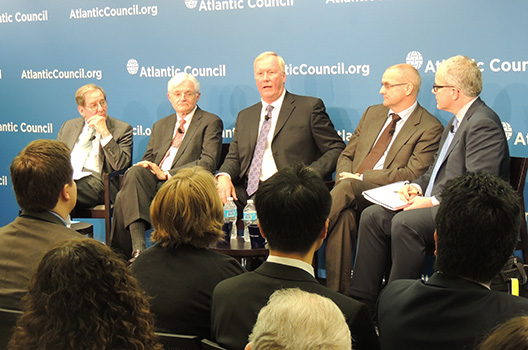 The Atlantic Council’s Global Energy Center hosted a panel discussion on September 29th, 2015 entitled “China: The Role of Nuclear in Meeting Energy Demand and Climate Goals.” Moderated by Amb. Richard Morningstar, the panel featured Dr. Joe Lassiter of the Harvard Business School, Assistant Secretary of Energy for International Affairs Jonathan Elkind, Chairman and CEO of NuScale Power John Hopkins, and Czech Ambassador-at-Large for Energy Security Václav Bartuška.
The Atlantic Council’s Global Energy Center hosted a panel discussion on September 29th, 2015 entitled “China: The Role of Nuclear in Meeting Energy Demand and Climate Goals.” Moderated by Amb. Richard Morningstar, the panel featured Dr. Joe Lassiter of the Harvard Business School, Assistant Secretary of Energy for International Affairs Jonathan Elkind, Chairman and CEO of NuScale Power John Hopkins, and Czech Ambassador-at-Large for Energy Security Václav Bartuška.
Dr. Joe Lassiter began with a presentation about the need for low-cost energy, particularly in developing countries, to sustain economic growth and development. Still, Lassiter stressed the urgent need achieve zero-net carbon emissions while making headway in the fight against global energy poverty. According to Lassiter, the solution to this problem is to focus in on innovation in alternative energy and energy efficiency. Lassiter pointed to small modular reactors (SMRs) as a technology that has the potential to produce large quantities of clean power at a competitive cost. Before closing, Lassiter stressed the point that in the developing world no power is much worse than dirty power and that clean energy solutions must be able to compete on a cost basis with coal if emissions reduction efforts are to succeed.
Jonathan Elkind of the Department of Energy noted that achieving climate goals will require successful outcomes for both the US and China, the world’s two largest emitters. Elkind reiterated Lassiter’s point that technical innovation has a huge role to play in attempting to resolve this matter, especially in the nuclear sector. According to Elkind, China’s nuclear goals may be overly ambitious but that its recently announced cap-and-trade program shows great promise.
John Hopkins of NuScale Power, described the technology behind his company’s SMRs as well as the benefits that they have over conventional nuclear fission generators. According to Hopkins, the primary uses for SMRs would be in electricity generation and water desalinization, particularly in situations and locations where scalability and safety are prized. SMRs could also serve to provide the variable base-load power needed to address intermittency problems with renewables like solar and wind.
In his remarks, Amb. Václav Bartuška highlighted some practical issues surrounding conventional nuclear power generation. The two biggest problems, he said, are staying on budget and on schedule. Bartuška noted that in his experience, he has yet to see a nuclear power generation facility stay on track with in terms of both cost and schedule. That trend breeds caution among countries considering major investments in nuclear power generation. He went on to speak about how in China, this leads to reluctance among state enterprises to construct nuclear facilities, citing the fact that it’s very difficult to explain to leaders in Beijing that a project is running over-budget and behind schedule.
